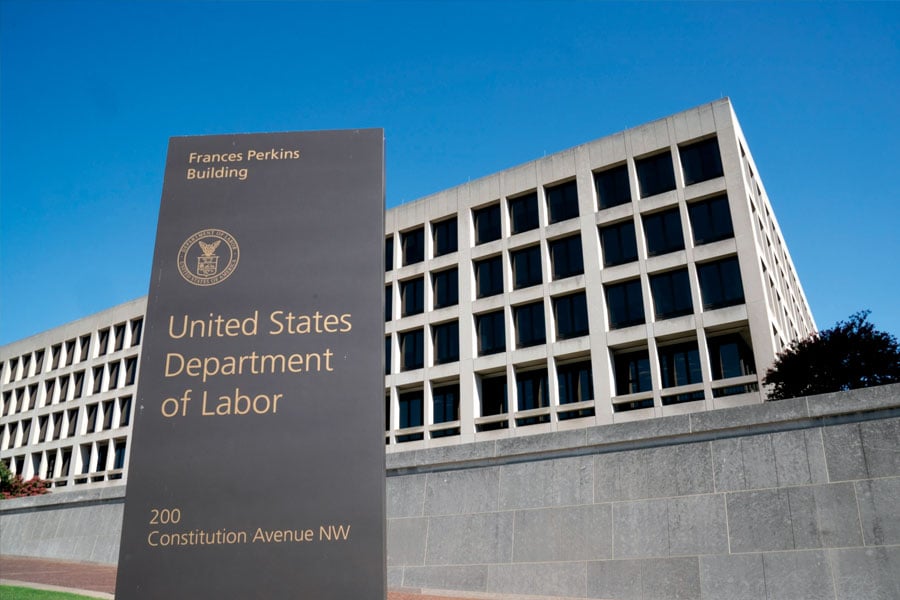

A group of Republican-leaning states that earlier sued the DOL over its recently implemented ESG rule for retirement plans claims that the regulator acted “arbitrarily and capriciously” in making it.
But the Department of Labor, which recently addressed the allegations in court filings, counters that it was careful to craft a much-needed rule for plan fiduciaries.
Those court filings — made earlier this month by the DOL and last month by the plaintiff states — both seek summary judgment. The DOL’s request would end the litigation, and the plaintiffs’ would have the new rule invalidated.
That rule, which became effective early this year, allows — but does not require — fiduciaries to consider factors such as environmental, social and governance criteria for a plan’s investment options. Although a rule passed at the end of the Trump administration technically allowed 401(k)s and other plans to include ESG-themed funds, it forbade the use of such products as plans' qualified default investment options — usually target-date funds.
Both iterations of the rule allow plans to consider ESG factors that are financially material. However, the Biden administration DOL contended that the wording of the Trump-era rule had a chilling effect that discouraged plans from considering ESG factors.
“The 2022 rule contradicts DOL’s prior finding that strict regulations are necessary to protect Erisa plan participants, which is a fundamental aspect of fiduciary law and the animating consideration of the 2020 rules,” the plaintiff states wrote. “DOL previously concluded that … [there are] ‘shortcomings in the rigor of the prudence and loyalty analysis by some participating in the ESG investment marketplace.’”
In drafting and finalizing the newer rule, the DOL failed to provide evidence to rebut that, leading to a regulation that hurt protections for plan participants, the plaintiffs stated. “That is arbitrary and capricious.”
That phrase is an essential component of the Administrative Procedure Act, the law that the states are citing to have the rule vacated.
In its defense, the DOL noted that the rule “clarifies that risk and return factors may include the economic effects of ESG factors where appropriate given the relevant facts and circumstances … thus plac[ing] Erisa plan participants and beneficiaries on equal footing with other market participants.”
Rescinding the two Trump-era rules affecting 401(k)s and pensions was necessary to do that, the agency stated. It also reaffirmed its stance that as long as two investment options are economically the same, fiduciaries can use “collateral benefits” to choose one over the other.
Despite the long list of states that have signed on to the lawsuit, the plaintiffs face a difficult road in defeating the DOL’s rule, largely because the agency went to great lengths to ensure that the process and product of its effort were sound, lawyers watching the case have said.
In its motion for summary judgment, DOL noted that the arbitrary-and-capricious standard in the law requires the regulator to reasonably explain itself and that a court cannot “substitute its own policy judgment for that of the agency.” And as long as the DOL can show that it didn't run afoul of the authority granted to it by Congress, it “‘need not demonstrate to a court’s satisfaction that the reasons for the new policy are better than the reasons for the old one,’” but rather only that "‘there are good reasons for’ the new policy.'”

AI is no replacement for trusted financial advisors, but it can meaningfully enhance their capabilities as well as the systems they rely on.

Prudential's Jordan Toma is no "Finfluencer," but he is a registered financial advisor with four million social media followers and a message of overcoming personal struggles that's reached kids in 150 school across the US.

GReminders is deepening its integration partnership with a national wealth firm, while Advisor CRM touts a free new meeting tool for RIAs.

The Texas-based former advisor reportedly bilked clients out of millions of dollars, keeping them in the dark with doctored statements and a fake email domain.

The $3.3 trillion tax and spending cut package narrowly got through the upper house, with JD Vance casting the deciding vote to overrule three GOP holdouts.
Orion's Tom Wilson on delivering coordinated, high-touch service in a world where returns alone no longer set you apart.
Barely a decade old, registered index-linked annuities have quickly surged in popularity, thanks to their unique blend of protection and growth potential—an appealing option for investors looking to chart a steadier course through today's choppy market waters, says Myles Lambert, Brighthouse Financial.
